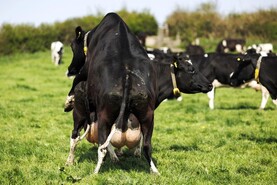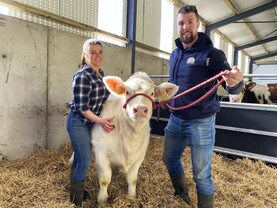A future UK government will make issues around air and water quality and also climate change its key priority, the former chief of AFBI, Dr Sinclair Mayne, told farmers at the AGM of the Fermanagh Grassland Club this week.
Mayne, who retired in 2018 after over 30 years working in agricultural research, outlined the challenges that NI faces, which are mainly due to having a much more intensive livestock sector than the likes of England, Scotland or Wales.
He said there was an argument for more agricultural support to come to NI, to help farmers address the various issues around methane emissions (a greenhouse gas), phosphorus in lakes and rivers, and ammonia emissions into the air.
Alternatively, policy makers could decide to place restrictions on production. “That’s a real danger we need to be aware of,” he said.
However, he pointed to good progress made by the dairy industry in reducing methane emissions per litre of milk, driven by higher efficiency on-farm.
“It’s not about your total – it’s about how efficient you are – we have got to make sure that story comes through,” he said.
On ammonia emissions, he suggested that it is potentially the biggest problem for local farmers, given that agriculture accounts for 91% of emissions in NI.
“Even DAERA didn’t see this one coming two or three years ago – it bolted out of the blue. Science will help produce the answers, but we also need to do the science now to answer questions that might come in five to 10 years,” said Mayne.
Breeding
One of the tools that can help drive efficiency and lower emissions is livestock breeding, suggested Mayne. However, he was critical of the lack of progress with a livestock genetics database in NI (despite an independent report being produced four years ago), pointing to the work of the Irish Cattle Breeding Federation (ICBF), which has become a world leader.
Grass
He also believes that future NI research needs to re-focus on grass, and specifically the potential yield benefits from mixed swards (containing clover and other grasses) and encouraging higher intakes when cows are grazing.
When asked whether individual farmers need to continually expand just to stay in business, he responded: “Get better first, and then grow. And be careful in growth that you don’t take your eye off the efficiency ball. Getting bigger is not always the answer.”
Read more
Planning rules on ammonia revealed
Banks wary of permitted development
A future UK government will make issues around air and water quality and also climate change its key priority, the former chief of AFBI, Dr Sinclair Mayne, told farmers at the AGM of the Fermanagh Grassland Club this week.
Mayne, who retired in 2018 after over 30 years working in agricultural research, outlined the challenges that NI faces, which are mainly due to having a much more intensive livestock sector than the likes of England, Scotland or Wales.
He said there was an argument for more agricultural support to come to NI, to help farmers address the various issues around methane emissions (a greenhouse gas), phosphorus in lakes and rivers, and ammonia emissions into the air.
Alternatively, policy makers could decide to place restrictions on production. “That’s a real danger we need to be aware of,” he said.
However, he pointed to good progress made by the dairy industry in reducing methane emissions per litre of milk, driven by higher efficiency on-farm.
“It’s not about your total – it’s about how efficient you are – we have got to make sure that story comes through,” he said.
On ammonia emissions, he suggested that it is potentially the biggest problem for local farmers, given that agriculture accounts for 91% of emissions in NI.
“Even DAERA didn’t see this one coming two or three years ago – it bolted out of the blue. Science will help produce the answers, but we also need to do the science now to answer questions that might come in five to 10 years,” said Mayne.
Breeding
One of the tools that can help drive efficiency and lower emissions is livestock breeding, suggested Mayne. However, he was critical of the lack of progress with a livestock genetics database in NI (despite an independent report being produced four years ago), pointing to the work of the Irish Cattle Breeding Federation (ICBF), which has become a world leader.
Grass
He also believes that future NI research needs to re-focus on grass, and specifically the potential yield benefits from mixed swards (containing clover and other grasses) and encouraging higher intakes when cows are grazing.
When asked whether individual farmers need to continually expand just to stay in business, he responded: “Get better first, and then grow. And be careful in growth that you don’t take your eye off the efficiency ball. Getting bigger is not always the answer.”
Read more
Planning rules on ammonia revealed
Banks wary of permitted development






 This is a subscriber-only article
This is a subscriber-only article









SHARING OPTIONS: